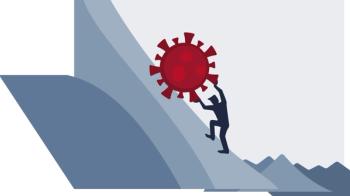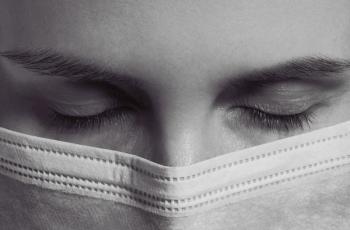There are moments in history that require us to step back and refocus, to view the issues before us through a new lens and from a different vantage point. We are all now sitting squarely in such a moment.
Trevor Noah, comedian host of the Daily Show, who regularly offers commentary on current events, spoke recently and with a serious tone, setting aside his usual comic repartee. He constructed a narrative in which stories that seem separate—COVID and race, Amy Cooper, George Floyd, the protests, and the looting—are, in fact, connected, the resulting forces surging together to form the “great wave.”1
We face multiple interconnected crises: the worldwide pandemic of COVID, the crashing economy and the overarching and crushing impact of systemic racism. And unrelentingly, the climate continues to change and the effects of climate dysregulation continue to roll out and roll on.
COVID-19 has taken the greatest toll on communities of color; specifically African-Americans, Hispanic, and Indigenous communities. These communities have suffered the greatest number of deaths. These community members are losing their jobs at higher rates than white workers. Black workers able to keep their jobs are often likely to be categorized as “essential” workers in service sector jobs. In such positions, people are often forced to choose between risking their health and trying to maintain the often-tenuous economic security of their families.
We have known for some time that communities of color, often lower income, are exposed to environmental risks at a much higher level when compared to more affluent, white communities. These more vulnerable community members have a higher rate of exposure to environmental toxins and climate-related diseases and the least access to quality health care. These community members are often living in buildings and in locations that cannot withstand the increasing fury of extreme weather events resulting from the changing climate. And yet, because of structural racism, these same communities get the least amount of attention and support to redress these environmental injustices.
As mental health professionals, we have a responsibility to more fully appreciate the corrosive impact of structural racism on individual and societal psyches. Ruth Shim, MD, addressing the social determinants of health, offers a graphic representation of the multiple forces coalescing into adverse mental health outcomes. Of note, climate change is now recognized as one of the social determinants of health.2
Perhaps some of us have enjoyed a kind of psychological comfort by keeping safe within our climate silo as we work on issues related to global warming. Is there a degree of protective privilege conferred by focusing so narrowly on climate change? Have we held a kind of hopeful expectation that in focusing just on the climate change part of the equation, it would naturally address the systemic injustices by a kind of ripple effect? That fantasy has been rattled. White, privileged people are positioned in a more “experience distant” manner from both the effects of climate change and racism than are communities of color. The events stemming from George Floyd’s murder have shown us a “here and now,” raw and bleak reality. The curtain has been pulled back, revealing the agony that has been present for centuries and is being expressed again on the streets of American cities. We must hold all things at this painful moment; the pernicious impact of systemic racism, the crisis of the COVID pandemic, and the immense threat of climate change.
Sam Grant, executive director of MN350.org in “Black Environmentalists Talk About Climate and Anti-Racism” suggests that we must “help people see the connection between that issue [racism] and the broader climate crisis. . . . So it’s not choosing this or that. Or this, then that. It’s this and that [bold added].”3
We must change our lens and see how these all weave together: the issues of the pandemic, the economic downturn, structural racism, as well as the degradation of our natural world caused by climate change. The classic figure-ground, vase and profile picture, familiar to us from psychology, is an apt model that allows us to toggle back and forth between a foreground focus upon the impacts of structural racism or upon the environmental crisis. Neither is more prominent or important but together reveal a fluctuating change in perspective. Both must be viewed to make the picture whole.
Perhaps the figure-ground metaphor captures the potential of this historic moment in a second way. We must focus on the foreground—the tattered and frayed aspects of our society now so harshly exposed. Yet, we must consider the background that is always present in a crisis, the possibility of transformational change. Both must be viewed to make the picture whole.
For climate advocates, we must make environmental justice core to our efforts, while simultaneously holding the awareness that climate change is progressing and threatens the habitability of this planet for us all. The real challenge is to bring new creativity to our efforts and forge multiracial coalitions to address the mental health and public health impacts of inequity, racism, and the climate crisis.
Dr Cooper is in private practice and she is Assistant Professor, Department of Psychiatry, University of California, San Francisco; she is on the Steering Committee of the Climate Psychiatry Alliance. Dr Mark is a staff psychiatrist at the Counseling and Psychological Services of the University of Pennsylvania, and a student in the Masters of Environmental Studies Program at the University of Pennsylvania; she is on the Steering Committee of the Climate Psychiatry Alliance. The authors have no conflicts of interest concerning the subject matter of this article.
References
1. Conrinthios A. Trevor Noah Relects on George Floyd Protests: “Police in America Are Looting Black Bodies. Yahoo Entertainment. June 1, 2020.
2. Shim RS, Compton MT. The social determinants of mental health: psychiatrists’ roles in addressing discrimination and food insecurity. Focus. 2020;18:25-30.
3. Sengupta S. Black Environmentalists Talk About Climate and Anti-Racism. The New York Times. June 3, 2020.







